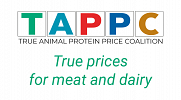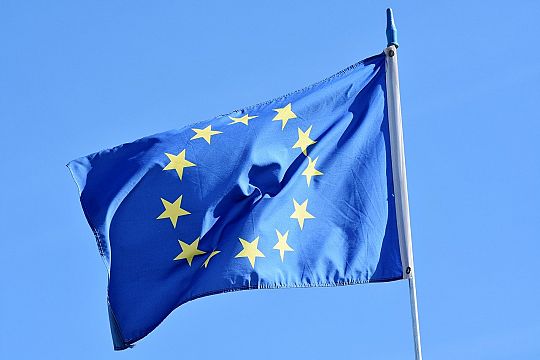EU Ministers (Finance/Agri/Envi/Health) asked to support and improve Farm to Fork Strategy
Ministers in all EU countries dealing with Budgets, Agriculture, Environment and Health are asked to agree with the new Food Policy of the EU Commission (Farm to Fork Strategy) and make it stronger with fiscal incentives to support consumption of healthy and sustainable food (vegetables, fruits) and reduce consumption of food with negative impacts on health and sustainability (like meat). The letter was sent by TAPP Coalition, a broad coalition of farmers, docters, youth, food companies, environmental and animal welfare groups. The letter can be read below and refers to a new EU petition launched this week: https://goodfoodprice.eu
More info: Jeroom Remmers, Director TAPP Coalition. info@tappcoalitie.nl.
To: Finance Ministers EU Member States (Ecofin)
Cc : Environmental, Health and Agriculture Ministers
Date: 29nd September 2020
Topic: EU Council meetings October, November – greening VAT /fiscal system food
Dear Ministers,
During the next Ecofin meetings and other EU Councils (Agri, Envi, Health) we trust that the subject of VAT reforms and the EU Green Deal (Farm to Fork Strategy, Biodiversity Strategy) will be on your agenda. We sincerely hope you are aware of this once-in-a-lifetime opportunity to implement the Farm to Fork Strategy, especially for future generations. The Farm to Fork Strategy published 20th May 2020 announced tax incentives that could reduce consumption of food with high environmental footprints / CO2-emissions. According to the EU Commission, quote:
“Tax incentives should also drive the transition to a sustainable food system and encourage consumers to choose sustainable and healthy diets. The Commission’s proposal on VAT rates (currently being discussed in the Council) could allow Member States to make more targeted use of rates, for instance to support organic fruit and vegetables. EU tax systems should also aim to ensure that the price of different foods reflects their real costs in terms of use of finite natural resources, pollution, GHG emissions and other environmental externalities”.
The EU Farm to Fork Strategy was presented together with the EU Biodiversity Strategy, because the production of meat and dairy, using animal feed like soy, leads to deforestation and biodiversity loss. The EU Commission is preparing legislation for products at the EU market associated with deforestation. In this way soy or meat products could become part of a licensing, ban or EU tax system. The TAPP-coalition asks you to support this proposal.
We recommend the Ecofin to consider an EU tax facilitation for meat products. This will allow a growing number of conscious consumers to pay for GHG-emissions in the same manner as consumers and companies pay a CO2-tax on fossil fuels. According to the EU Commission “all trade policies have to do no harm to biodiversity”. Soy and beef imports from South America should be banned or should be subject to high import taxes to reduce trade in products that harm biodiversity and have lower CO2-standards (e.g. wildfires in the Amazon, deforestation for new soy plantations or beef production). The root cause of 30-60 percent of global biodiversity losses are meat and dairy based diets (WWF UK, PBL ). In this letter, we appeal for a decision related to the next topics:
1) A zero VAT rate for vegetables, fruit, cereal products and plant-based meat/dairy alternatives, within the EU Commission proposal to allow more flexibility in the reduced rate of at least 5%.
2) The new EU proposal or action plan to encourage Member States to implement an excise duty per kg meat and per kg cheese and dairy, based on full external environmental costs like GHG-emissions, nitrogen and particulate matter and biodiversity-loss, based on ‘true price accounting’ principle. The proposal of CE Delft consultancy, 2020 (Sustainability charge on meat ) and TAPP Coalition may lead to 120 Mton CO2 eq. reduction. This is equivalent to all GHG emissions from Ireland, Denmark, Slovenia and Estonia combined. Our proposal also leads too additional financial support for sustainable farmers of 10-15 billion euro per year and to a reduction of 9 billion euro per year of health care costs in the EU.
3) The new excise duty per kg meat at EU Member State level can be applied to meat products sold in supermarkets/catering locations/restaurants or at the level of slaughterhouses and butchers in EU Member States and at imported meat products from outside the EU. In this way, the excise duty can also be seen as a carbon border adjustment mechanism for imported meat products. The excise duty for imported meat products can be higher compared to the excise duty applied at meat products, produced in the EU, if external environmental costs per kg meat are higher for imported meat products compared to meat products from the EU. FAO data of CO2-eq emissions per kg meat can be used to calculate the tariff of excise duties of meat imports to the EU, see http://www.fao.org/faostat/en/#data/EI/visualize
For CO2 eq emissions per kg chicken, pig meat and beef/cattle per country in 2017 for example: http://www.fao.org/faostat/en/#data/EI/ As can be observed, CO2 eq. emissions for European beef are lower compared to beef from South America. This can be a justification for a higher ‘green’ tax on imported beef from South America.
4) All meat and dairy products can be transferred from the low VAT tariff to the normal tariff (include them on a ‘negative list’ for products not to be used for the reduced VAT tariff). .
5) We ask you not to support the EU Commissions plan for a voluntary EU Code of Conduct for supermarkets to prevent too low prices of meat. The idea is good, but it will not work as there always will be free riders and there is no penalty for them. So better start legislation to make sure supermarkets don’t sell meat with too low meat prices like Belgium/France have.
6) Dairy factories and slaughterhouses could be part of the ETS system for CO2 eq. trade and reduction, to include agriculture emissions (CO2, CH4 N2O from animal husbandry) into the ETS, like aviation and shipping.
Finally we like to inform you about a European petition goodfoodprice.eu. The petition started this week, asking EU Member States (and the EU Parliament) to support the EU Farm to Fork Strategy to make healthy, sustainable food the easy choice. But the Strategy lacks fiscal incentives. That’s why EU consumers ask you to act. In your own country you could consider new fiscal policies or consumer subsidies to make vegetables and fruit and plant based proteins cheaper. We ask you to tax food which is unhealthy: food we eat too much according health recommendations (like meat).
More information about proposal for ‘true pricing’ of meat at EU level, see our TAPP Coalition and CE Delft reports presented 5th of February 2020 at the EU Parliament, with global media coverage: https://tappcoalition.eu/nieuws/13130/eu-parliament-to-discuss-dutch-proposal-for-a-fair-meat-price-5th-of-feb and https://tappcoalition.eu/nieuws/pagina/2
More info about German and Dutch government meat tax proposals: https://tappcoalition.eu/nieuws
We hope to hear your reaction and decisions. With kind regards, on behalf of our partner organisations (farmers, doctors, youth, food companies, charities),
Jeroom Remmers
Director TAPP Coalition
True Animal Protein Price Coalition
https://tappcoalition.eu / 0031-622407712
Attachment 1 - Petition Urgent EU action needed for sustainable and healthy food
Petition https://goodfoodprice.eu
To: European Ministers, EU Commission and European Parliament members.
Dear friends across Europe,
Our food needs a true price, a more honest price, to make healthy and sustainable food the easy choice. And to make sure farm animals live a more happy life. We need your support to improve a new EU Commission food plan, for less and better meat. Why is this important?
Avoiding or reducing meat consumption is ‘the single biggest way’ to reduce our impact on the planet (climate change, deforestation, air- and water pollution), it will massively bring down public health care spending and can help guarantee a better future for farmers and farm animals, if tax revenues are used partly to pay farmers improve sustainability and animal welfare standards.
In weeks, EU member states will meet to discuss food and agriculture taxes and subsidies for the Green Deal for food: the EU Farm to Fork Strategy. This EU Strategy is a first step to tackle the environmental and health crisis in our food system (climate change, biodiversity loss, pesticides, obesity, junk food). The EU Strategy includes to move to a more plant-based diet with less red and processed meat and with more fruits and vegetables. This will reduce risks of life-threatening diseases and the environmental impact of the food system. Therefore, marketing campaigns that advertise meat at very low prices have to be avoided. Supermarkets have to be obliged to stop low pricing of meat. The EU Commission also proposes to ensure that EU tax systems reflects the price of food including the real costs in terms of use of finite natural resources, pollution, greenhouse gas emissions and other environmental externalities. This means: meat and dairy should be taxed more, like we tax fossil energy and tobacco too. The Strategy also proposes to reduce the VAT rate to zero percent for (organic) fruit and vegetables and to leverage tax incentives to encourage consumers to choose sustainable and healthy diets. Finally, 25% of the EU’s agricultural land has to be under organic farming by 2030. But EU Ministers and lobby groups try to block the EU Food Strategy. A lot is at stake. So sign this petition to give a strong signal!
5 elements to be amended in the Farm to Fork Strategy, to make the proposal more specific:
1. Set measurable targets to reduce the EU consumption of meat, dairy and eggs while reducing industrial animal production, e.g. 10-25% reduction in 2030.
2. Ensure fair prices for EU farmers producing sustainably with high animal welfare standards, and EU import taxes for meat with lower CO2-standards, eg. Brazilian beef.
3. EU action to encourage and finally oblige member states to make sure meat and dairy at retail level reflect the real cost of pollution and greenhouse gas-emissions by 2025. E.g. excise duty (CO2-tax) or animal welfare meat tax like Germany proposed (>20 eurocents/100 gram meat needed).
4. Half of the tax revenues should be redistributed to farmers for sustainability and animal welfare. Remaining revenues can be used for consumers: (fiscal) subsidies on vegetables, fruits, plant-based meat and low-income group ‘compensation’ payments.
5. Phasing out EU subsidies promoting meat; reducing subsidies for meat & dairy production.
Julia Klöckner, the German CDU Agriculture minister, and EU Council Chair, proposed a meat tax, with the proceeds to support farmers to enhance animal welfare and reduce CO2 emissions. We need more political leaders like her. Will the EU Minister Council embrace our asks? Let’s empower them with thousands of messages and inspire EU Minsters and the EU Parliamentarians to be the courageous leaders we need!
SEND A MESSAGE TO EU MINISTERS AND SIGN THE PETITION! Thanks!
This petition is run by the TAPP coalition, a group of farmers, doctors, youth, companies and charities.
MORE INFORMATION:
EU Commission proposes higher meat price in Farm to Fork Strategy and zero percent VAT tariff for vegetables and fruits: https://tappcoalition.eu/nieuws/14050/eu and https://tappcoalition.eu/nieuws
Guardian: EU parliament discussion about a sustainability charge on meat: https://www.theguardian.com/environment/2020/feb/04/eu-meat-tax-climate-emergency
MEPs opinion about Farm to Fork Strategy not green enough – relation with meat https://www.brusselstimes.com/all-news/eu-affairs/115683/is-eus-farm-to-fork-strategy-green-enough/


